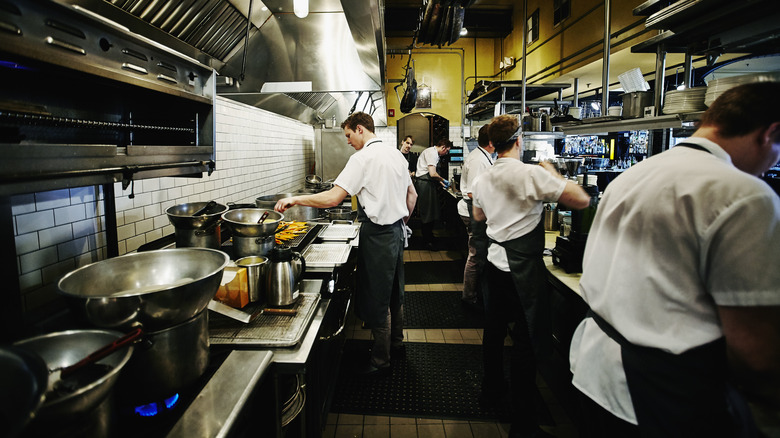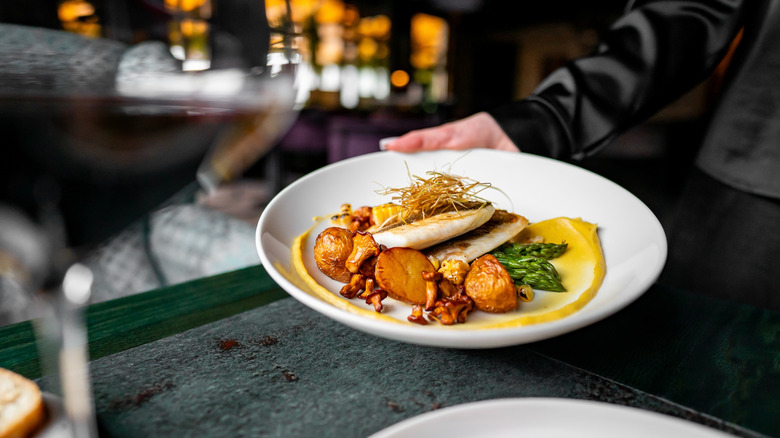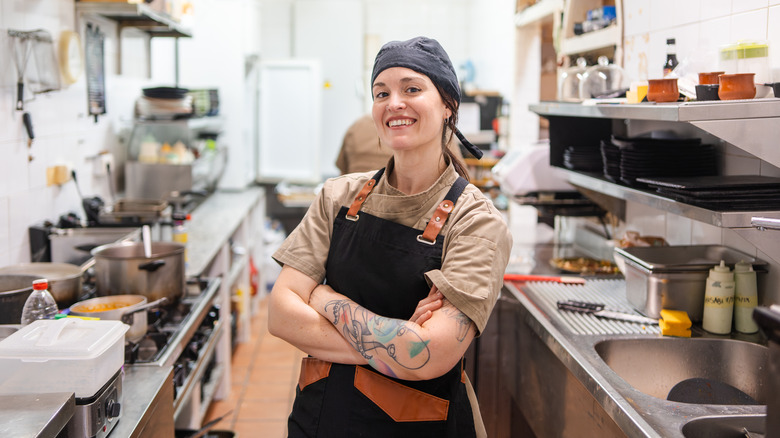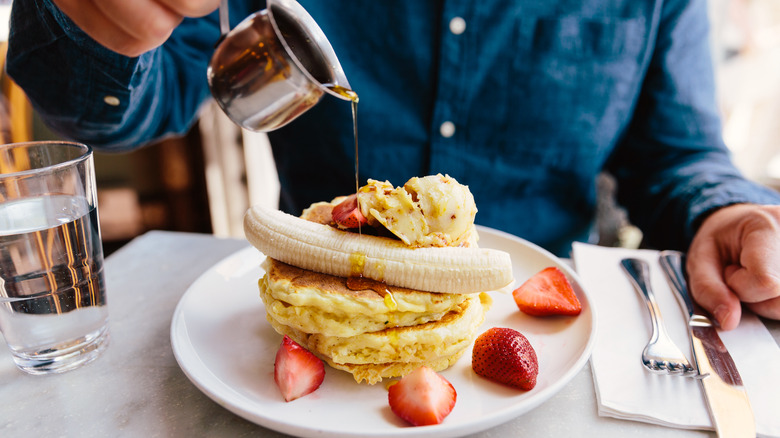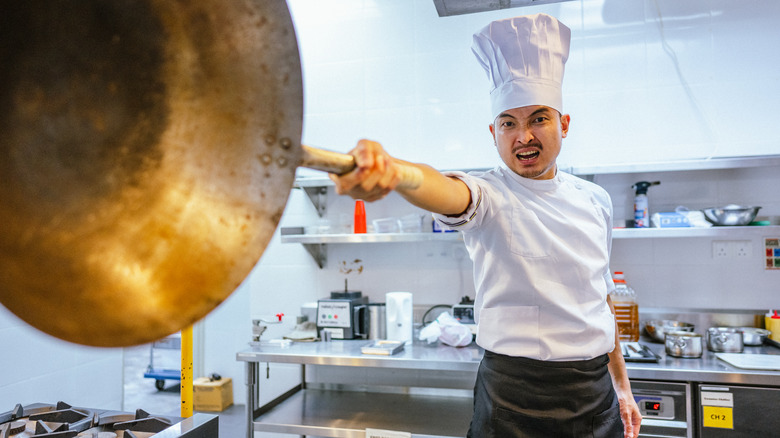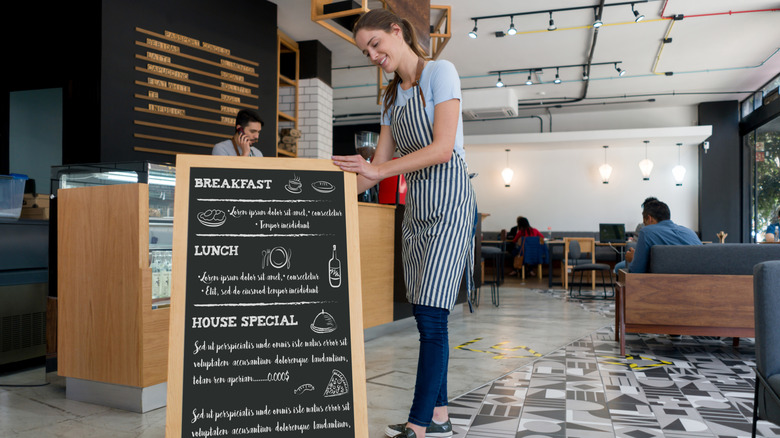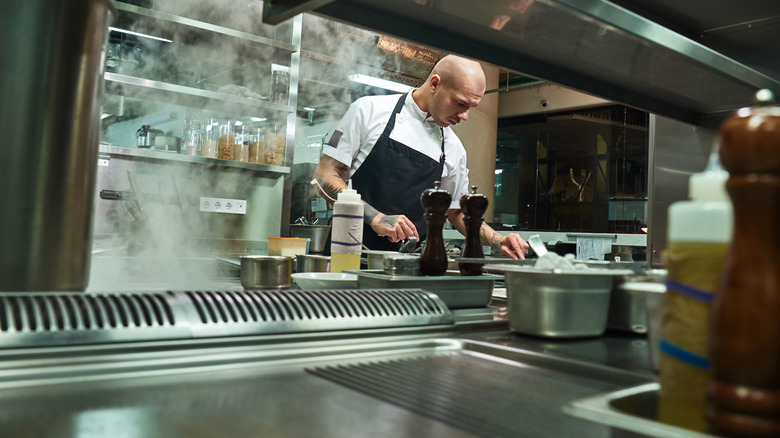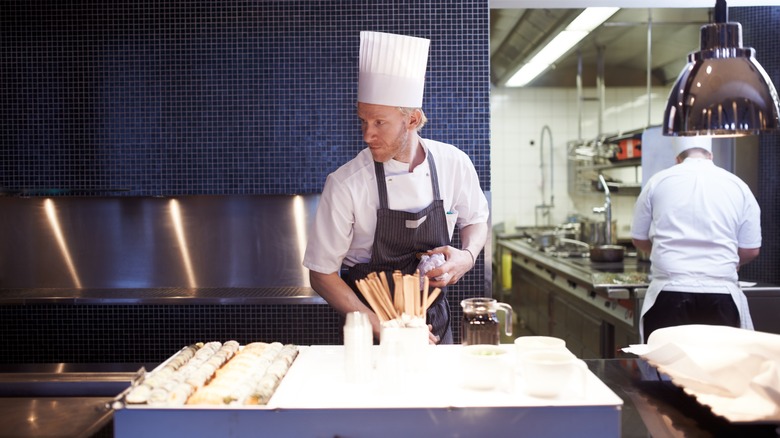9 Things That Still Hold Up In Anthony Bourdain's Kitchen Confidential And 4 That Don't
Chef, traveler, and world renowned foodie Anthony Bourdain's big break was an article he wrote that eventually led to his book "Kitchen Confidential: Adventures in the Culinary Underbelly." The book made people all over the world fall in love with Bourdain and his gritty, honest way of speaking. His words also shed light on the restaurant industry while validating the experiences of countless blue collar kitchen workers.
I spent almost a decade in the industry as a server, bartender, and restaurant manager. Working in dive bars, country clubs, and hotels, I've seen a lot of things in the industry. This mixed with my appreciation of Bourdain's work gives me the ability to pinpoint which parts of "Kitchen Confidential" still ring true concerning the restaurant industry.
One untold truth of Anthony Bourdain is that much of what he did throughout his career was a love letter to food and the people who make it. Over 25 years later, much of what he wrote in that first letter of love is still relevant. From someone who knows a little something about the industry, here are the things in "Kitchen Confidential" that still hold up in restaurants, and some that don't.
Still holds up: Line cooks are the heroes
The first thing you should know about working in the restaurant industry is that it is hard work. There are no stress-free positions in a restaurant, but it's the kitchen that sees the most heat. Anthony Bourdain, having been in this faction of the industry, knew this and made sure everyone reading his book knew it too. As he wrote in the introduction of "Kitchen Confidential," "Line cooks are the heroes."
This is very much still true. Not only are line cooks sturdy folk, but they don't get nearly enough love. These men and women are working over flames, with hands that have been burned so many times they no longer feel the singe of a metal pan on a burner. Not only that, but they are often working quickly, with impeccable timing. They're both the backbone and the heart of a restaurant. As a server, I could lift 50-pound trays over my head with one hand while remembering three full courses of modified meals for a party of seven. I still couldn't touch the skill of a good line cook.
These saints regularly pace a grill full of different cuts of meat, all at different temperatures, while other line cooks, a chef, and a kitchen manager scream at them. A restaurant's ability to thrive is based on a solid kitchen, and it takes some serious skill and grit to pull out a busy night of service.
Doesn't hold up: Avoid ordering fish on Mondays
In "Kitchen Confidential," Anthony Bourdain warned customers to avoid ordering fish dishes on Mondays. When he wrote it, he had some solid reasoning. Tuesdays were (and commonly still are) the slowest day of the week for restaurants and the smartest day to spend time unloading food from delivery trucks. Even if additional shipments arrived for the weekend rush, Monday would still default to the least fresh fish.
This is no longer the case because plenty of distributors can and will deliver on the weekends. Even with this development, something seafood restaurants don't want you to know is that the vast majority of fish you're eating at restaurants is frozen. Even if it's marked as fresh fish, it's typically flash frozen. So, it really doesn't matter what day of the week you go out and order seafood. Back in 2016, Bourdain even admitted his no fish on Mondays rule was outdated.
Still holds up: The loyalty among good restaurant industry workers
It's hard to find good help, and this is especially true in a restaurant. Frankly, there are not many people who can hack it in this business. The turnover rate of any given restaurant is around 75%. Those that do stick around, though, form a bond that lasts decades. This is why Anthony Bourdain said he often kept the same staffers when he bounced from restaurant to restaurant.
Finding a staff that can get along and get the job done is wildly valuable, and it's one of the only things that really matter in the industry. There is nothing that connects restaurant workers better than being good at what they do, and it's not abnormal for co-workers to follow each other to new restaurants. I've seen groups of servers completely shift restaurants at least twice in my career, and I've been hired for jobs without an interview based solely on a former co-worker's recommendation. The restaurant community, for those who are skilled in it, is strong.
It makes sense that this strong sense of loyalty is still very much prevalent in the restaurant industry. If the ship sinks, everyone goes down with it. A staff that is skilled and works well together keeps the restaurant afloat, and that's in everyone's best interest. Yes, there is an emotional bond that forms, but it's often born of self-preservation.
Still holds up: Kitchen staff look like pirates and have the mouths of sailors
In many ways, restaurants are the essence of the American dream. The industry is one of the few that actually rewards those willing to put in hard work over everything else. Restaurants take the weary and poor, those with prison tattoos and those without a high school diploma, and allow them to rise above their station. In a kitchen, anyone who can hack it gets respect. Anyone who can keep up on the line and makes it out the other side of the night deserves a drink and a cigarette, the end of night ritual at many restaurants.
With their line cook garb (which sometimes even includes some pirate-esque striped pants), faded tattoos, and various states of shaggy hair, line cooks look very much like a bunch of pirates. They sound like it too, both on and off the line. Their language is often so colorful that very little of what they say on the line can be said in this article. This is the case now, and it was the case when Anthony Bourdain was just starting out in the industry at the age of 17. This grunge vibe is one Bourdain romanticized throughout his life and in his book. "The cooks are a dysfunctional, mercenary lot, fringe-dwellers motivated by money, the peculiar lifestyle of cooking, and grim pride," he wrote. Bourdain loved it, and so do many of the pirates swaggering in the back of house.
Doesn't hold up: Brunch is just a buzzword
Unbelievably, not everyone loves brunch, and Anthony Bourdain was one of these brunch haters. Break out the mimosa flights and eggs benny, though, because brunch is very much here to stay. Decades ago, brunch may have been a buzzword used to make money on hungover partiers and preppy foodies, but it's now a Sunday (and sometimes Saturday) staple.
Anthony Bourdain had some cross words for chefs who promoted brunch, saying, "Brunch menus are an open invitation to the cost-conscious chef, a dumping ground for the odd bits left over from Friday and Saturday nights or for the scraps generated in the normal course of business." This is very far from the truth now. It's not uncommon for restaurants to order shipments specially designed around having enough stock for brunch service. Honestly, brunch is so popular that restaurants still may end up selling out of items.
Still holds up: Vices have a place in the restaurant industry
Anthony Bourdain is very clear about the devious going-ons of a restaurant's back of house, and they're one of the reasons he fell in love with the industry. Quite a bit of the shenanigans cooks and other staff members get into are related to one addiction or another. Decades later, the restaurant industry still sees more than its fair share of alcoholism, drug use, and cigarette smoking.
According to a study by the Substance Abuse and Mental Health Services Administration (via Nation's Restaurant News), there are more smokers in the restaurant industry than there are in any other occupation. Alcohol addiction and drug use are famously common here as well. The long, late hours play a role here. Many industry workers go out after their shifts end and try to have some kind of life outside of work. Ironically, many just end up at another bar that happens to be open later than their own place of employment.
Still holds up: You should lie about why you left your last job
Most of what Anthony Bourdain imparts in "Kitchen Confidential" is related to the kitchen or his life as a self-proclaimed degenerate, but he regularly drops some solid advice. One thing in particular is great advice for anyone switching jobs in any industry. "Under 'Reasons for Leaving Last Job,' never give the real reason," he wrote, "unless it's money or ambition." This is interview gold for anybody, but those in the restaurant industry should take it to heart a bit extra.
The turnover rate in restaurants is high, remember? But not all of those turnovers are leaving the industry. Most restaurant workers work at a lot of restaurants in their career. Few ever stick it out with just one or two long-term gigs. There are many reasons why a server or kitchen worker would leave a restaurant, very few of which need to be hashed out to a potential new employer. Unreasonable managers, conflicts between front and back of house, or things done below your standard are all red flags that hiring managers look for in potential staff. No one wants a high-conflict service floor or kitchen line, so keep any grudges against your former or current employer to yourself.
Doesn't hold up: The symbiotic relationship between the kitchen and bar
When speaking on the relationships between the different players in a restaurant, Anthony Bourdain was pretty spot-on. One statement he made in "Kitchen Confidential" is a bit outdated now, though. "There has long been a happy symbiotic relationship between kitchen and bar," Bourdain wrote. "Simply put, the kitchen wants booze, and the bartender wants food." Unfortunately, this relationship is now a bit lopsided in many restaurants.
The bar still wants food. Everyone, from the bartenders and servers to obviously the customers, wants food. The kitchen workers absolutely still want booze, but they aren't readily getting them. There was once a time when bartenders could sling whatever booze they'd like wherever, but in the age of counting shots and recording every ounce of alcohol poured, it's a no-go. Shift drinks are still a thing at some restaurants, but these don't always translate to a better relationship between front and back of house because it's essentially the owner who is shelling out the drinks. Sometimes, the best a front of house employee can do these days is slip a quart container of ice water or soda over the line to the cooks.
Still holds up: Servers should stay off the line
There is a very distinct rift between front of house and back of house restaurant employees, but the smart servers stay on the line cooks' good side. The fastest way to rock the already teetering boat is for a server to step behind the line. The moment one of their slip-resistant shoes crosses over, it's like the ringing of a war horn. Stay off their line unless invited, keep their things where they leave them, and for the love of God don't touch their knives or anything on the grill.
As flippant as the back of house can come off, they truly care about their work environment. As Anthony Bourdain puts it, "Your station, and its condition ... is an extension of your nervous system — and it is profoundly upsetting if another cook or, God forbid, a waiter — disturbs your precisely and carefully laid-out system."
If by some miraculous shift of reality a server is ever invited on the line, you know the kitchen has mad respect for them. Even if it's just to make a dessert or grab a side of dressing, a server welcomed on the line is akin to Gollum willingly handing over the One Ring. For this to happen, the kitchen has to be in some serious weeds and desperate for some kind of relief. Even so, they'd likely rather crash and burn than enlist the help of a server.
Still holds up: Special is still just a pretty word for leftovers
I'm going to say that Anthony Bourdain's opinion of restaurant menu specials still holds up, but there are some serious exceptions to this one. Bourdain rightfully said that specials were just a way for chefs to use up their product. "Shepherd's pie'? 'Chili special'? Sounds like leftovers to me." This certainly isn't always the case anymore, though.
Restaurants have evolved into something that is always growing, and creativity runs rampant. People regularly go out and want to see menus shifting and new things on offer. I've worked at restaurants, both highbrow and divey, that have shopped for ingredients after crafting a special. That said, it's also common practice to make soup out of leftover ingredients and come up with specials to help eliminate waste and curb costs.
The word "special" shouldn't scare you or put you off a dish. However, there is a good chance you're ordering something that previously wasn't popular enough to sell off inventory.
Doesn't hold up: Employees stealing vans full of restaurant product
"Kitchen Confidential" is full of unsavory restaurant moments, most of which I can reasonably see happening. However, Anthony Bourdain tells a story about kitchen staff at his first industry job regularly loading up steaks and all kinds of kitchen goodies to take home. While petty theft definitely happens, there are now so many guardrails in place that major theft would be caught right away. Some restaurants have hands-off owners, but walking out with more than the occasional bottle of whiskey would still be very hard.
In all my time working in restaurants, I've never seen or even really heard of vacuum-sealed steaks or expensive food items going out the back door in bulk. The occasional liquor bottle or meal would go missing into someone's bag, sure. However, grand larceny wasn't a regular occurrence — at least not from the tipped or hourly employees.
Still holds up: A clean cooking station means a mess-free mind
Cleanliness is not something that many associate with line cooks, as per my previous claim that they kind of look like pirates and have quite dirty mouths. When it comes to their cooking stations, though, one often finds a system of organized neatness. This practice is called mise-en-place or meez, and it's one unexpected way to get a mental boost before cooking. Line cooks use it before, during, and after cooking service as a way to keep their minds clear and on task.
Anthony Bourdain took the practice very seriously, writing in "Kitchen Confidential," "Mise-en-place is the religion of all good line cooks. Do not [mess] with a line cook's 'meez.'" This French term simply means to put everything in its place, so that cooks have what they need on hand and ready. It's a method that has helped generations of chefs build upon their skills and still continues to inspire and ground cooks.
Still holds up: Restaurants have their own subculture and language
For many industry people, the quirks of being part of this subculture stick around until long after they leave the restaurant business (if they ever do). Those who have worked in a restaurant at any point in their life have tells. Whether it's calling out "corner" or "behind" as they maneuver in tight quarters or a simple "heard" in acknowledgment. Restaurant culture goes deeper than just lingo, though, because there's something bonding about working through a 300-cover service together. Closing a restaurant just to go to another for an after-work drink is something many service industry workers find an irony in that sticks.
The subculture of the restaurant industry hasn't changed much because for me and many other former industry workers, "Kitchen Confidential" transports us right back into the kitchen. It's nostalgic in the way a childhood home is. Largely, it's this subculture of restaurant work and life that makes Anthony Bourdain's first book hold up so well decades later.

